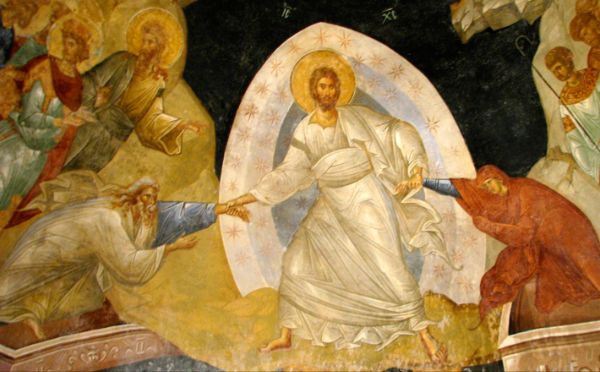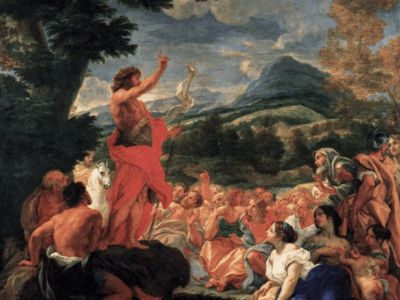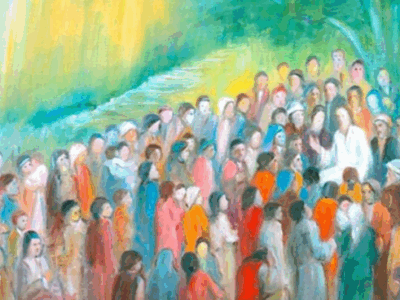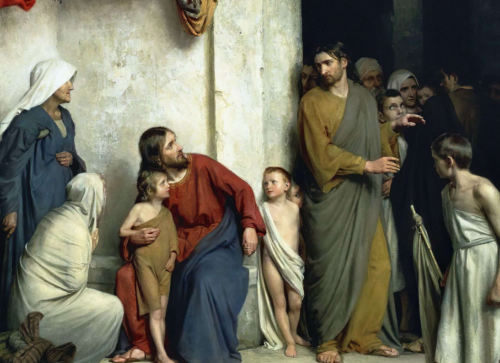
1st Sunday in Advent/A Seven-week Advent
(22nd Sunday after Pentecost)
Year C Readings
Job 19:23-27a,
Psalm 17:1-9
2 Thessalonians 2:1-5, 13-17
Luke 20:27-38
Some may and others may not know that all episcopal priests are deacons as well. Indeed, ancient Christian theology understands that, beginning with Baptism, ordination initiates a change to the essence of who we are: so all priests and bishops are still deacons. Far from being something that the priests of the Church leave behind, Christ’s ministry of service to the poor and oppressed exemplified in the Holy Order of Deacons is the most important and therefore the very first thing someone called to the priesthood needs to discern and internalize.
After I was ordained as a deacon back in December of 2024, I was sent to St. John’s Episcopal Church in Grand Haven to complete my discernment for the priesthood with Father Jared Cramer. Father Jared gave me many gifts. Principal among these was that he became my pastor: he selflessly cherished my experience and celebrated my gifts; he encouraged me in my mistakes and ignorance; he reverently showed me by his own example how putting on my vestments for Eucharist can be a meaningful moment of prayer; and Father Jared lovingly helped me see all my regrets and past failures in the light of the Cross, where Jesus, broken and bleeding and thirsty is somehow able to say, “Father forgive them, they know not what they do.” All of this spiritual and professional formation looked toward its culmination in my ordination to the Sacred Order of Priests, and I talked with Father Jared about my reverent sense of fear, astonishment, and even incredulity that this unspeakable blessing was to become part of my life. Father Jared offered one word in response to my confession of these feelings, the Greek word: Axios! It means “worthy” and comes from Paul’s letter to the Ephesians where he says to the church:
In telling me I was worthy, Father Jared was not dismissing my feelings, but validating them. The outward signs that my spiritual life was in the right place for ordination to the priesthood were these strange feelings, born of the Holy Spirit’s gift of humility. Then, to lead me into a more profound contemplation of my vocation, he suggested a book that would help me prepare. That book is called The Christian Priest Today, published in 1972 by Michael Ramsey, the 100th Archbishop of Canterbury.
In his book, the Archbishop speaks directly to those preparing for ordination, and one of the things he addresses is the temptation all people experience to engage in partisanship, and how especially damaging it is for the clergy to give in to this temptation. In particular, Ramsey highlights how being partisan makes us dwell either on a past which we too passionately revere, or a future which we too emphatically proclaim. Ramsey shows how allowing these visions to occupy the place of Christ at the center of our hearts and minds leads us to squander our energy in the present as we lose our true and best selves in the idolatrous sin of self-righteousness. In a moment of apostolic wisdom, Ramsey writes:
When I read Paul’s warning to the Thessalonians about the presence of the Evil One in our daily lives and feelings, and then read the Gospel passage in which the Sadducees flaunt their partisan disbelief in the resurrection of the dead, this moment in Archbishop Ramsey’s book came immediately to mind.
Paul wants the Church to understand two essential things about Evil. First, the hallmark of Evil is that It exalts Itself and tries to make what It desires the absolute truth, taking the place of God. Second, all who likewise place their own personality at the center of their imagination are, to quote the Apostle, “…destined for destruction.”
Think this through, belovèd in Christ, because the implication is provocative and challenging: When we exalt ourselves at someone else’s expense, especially at Christ’s expense, we are being deceived by a satanic impulse. When we insist on being right even when it harms or threatens others, we are then and there possessed of a spirit of destruction.
Similarly, when, like the Sadducees, we assume that the limits of our imaginations somehow limit the possibilities of God’s New Creation, we supplant the Redeemer’s truth with our own, binding ourselves to a reality that has no future. For there is no future at all besides the New Creation inaugurated by the resurrection of the Crucified Christ. It seems wise to let that sink in:
Apart from the future of the Resurrected Christ,
there is no future at all.
As Jesus points out to the Sadducees, our relationships with each other in the New Creation will go far beyond our preconceived notions of who’s right and who’s wrong. With the exception of abuse, which is to be condemned in every form, our scriptures today urge us to spend a great length of time in self-examination before we ever dare to pass judgment on another.
If you’re anything like me, this realization leaves you in some state of fear, astonishment, and even incredulity. Passing judgment on others is the meat and potatoes of our culture; it’s as American as apple pie! So allow me to highlight not only the challenge, but the grace of the Gospel as well.
Just as the work of the Evil One is manifest through interpersonal and political violence or every kind, so too the antidote to these poisons are found in acts of kindness and reserve, conceived by the Spirit of Life in our reception of Christ’s forgiveness and love. When we feel despair and even rage about the worldview and actions of others, we need to hold our feelings up to the light of this Gospel truth: to God, all of them are alive. Every human being, without exception, is a beloved creature; and we have all been given life by the Creator in the hope that we might share the Divine Life forever. Being self-righteous will never lead us to the Divine Life. But if we will let the righteousness of God live in us, we will realize our ability to seek our own flourishing in the flourishing of others.
These plain yet startling truths of scripture also call us to recognize that many among us are not exalted at all. Indeed, from the time of their birth or because of their circumstances, millions of people are unjustly relegated to the margins of power and wealth in both public and private life, simply because they have fewer resources, have darker skin, are a woman, are young, or personify an alternative gender and sexuality. Many among us have struggled to flourish because of the ways others have denigrated them. So we must say boldly that in the Gospel today, in response to the denigration of the Sadducees, we find Jesus engaged in a moment of self-actualization, revealing to us that it is not wrong to be and continue to become our best selves. Rather, it is immoral, which is to say evil, to articulate our individuality in ways that wound others. In can be no accident that in the very next verse after the end of our Gospel reading, Luke shares that “…some of the scribes answered, ‘Teacher, you have spoken well.’” (v. 39) Clearly, Jesus did not rebuke the Sadducees. It seems he spoke to them in a way that caused their hearts and minds to open to new possibility. You see, he loved them as much as anyone else. Even as he challenged their entrenched, partisan notions about the afterlife, he did it with kindness and invitation.
“So far as it concerns us,” may Jesus’ way of being be our rule of life, that the Lord might “hear our pleas of innocence, and give heed to our cries;” “for at the last, in our flesh we shall see God.” In that great accounting of our every word and deed, may we be justified by our response to Christ… by our attempt—however meager—to live our faith in fear and trembling, that our Lord and Savior might say to us: Axios! Welcome home my beloved, my friend.
Amen.








